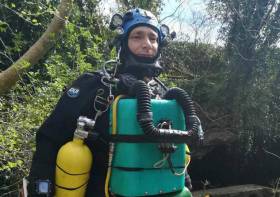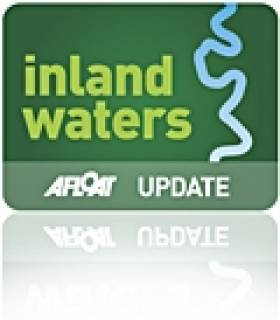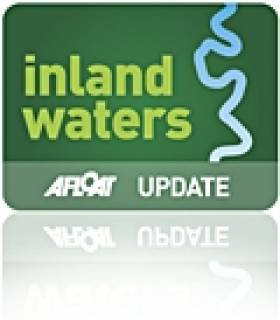Displaying items by tag: Nenagh
#Diving - This year’s Dive Ireland International Expo opens tomorrow (Saturday 2 March) at the Great National Abbey Court Hotel in Nenagh.
Hosted by the Lough Derg Sub Aqua Club in association with the Irish Underwater Council, the two-day event will as ever feature a wide array of diving exhibitors, traders and speakers, as the Nenagh Guardian reports.
Star among them will be Clare-based cave diver Jim Warny, just months after his key role in the dramatic rescue of a youth football team from a flooded Thai cavern network.
Recently Warny was a guest at the Pendulum summit in Dublin where he downplayed his heroism, describing himself as “just a person with a specific skill”.
Three Opportunities for Lakeside Living
#WATERFRONT PROPERTY - The Irish Times features a selection of serene lakeside properties to suit a variety of tastes and budgets.
Urrahill in Ballycommon, Nenagh, Co Tipperary is a detached home overlooking Luska Bay and Lough Derg and comprising three levels.
The upper level features living rooms and a kitchen with large windows and stunning views. The middle level has four bedrooms, with the main en-suite on the lowest floor with sliding doors to a private terrace.
Colliers International is asking €1.5 million for this ultra-modern property.
Meanwhile in Kerry, a four-bed country house on 1.5 acres is less than a mile from Waterville yet features its own pier with boathouse on Lough Currane, known for its salmon and trout angling.
The house has central heating throughout, oak flooring, a lounge with its own wood-burning stove, a fully fitted kitchen, car garage and utility shed. Kerry Property Services is asking €580,000.
Last but not least, those looking to renovate would surely be attracted to Eden Point in Rossinver, Co Leitrim, a two-bed, two-bathroom detached home on the shores of Lough Melvin.
Eden Point boasts "hundreds of metres" of foreshore, as well as a boat house and quay, and included in the sale is a share in the Rossinver Fishery Sundicate (worth €5,000) which allows free use of the Rossinver Fishery. Fermanagh Lakeland Properties is asking €250,000.
Sailors Plan Month Long Journey from Shannon to Liffey and Back
Nenagh resident and inland waterways enthusiast, Nick Theato, single-handed aboard 'Bo-Bo, a five metre Pedro trailer/sailer and Pat Kelly, Killadangan, with his son Andrew in 'Shu-Ra-Nu', a 6 metre Etap 20 trailer/sailer, plan to raise funds for Lifeboats Ireland by undertaking the IWAI Green & Silver Challenge in June, 2011. Their fundraising target is €5,000.00.
On the 25th June, 1946, Tom and Angela Rolt left Athlone aboard 'Le Coq', a 28ft.x8ft. converted ship's lifeboat on a voyage that would inspire contemporary and successive generations of inland waterways enthusiasts.
Tom Rolt wonderfully documented the voyage in his book 'Green & Silver', published in 1949, which has since become a classic. This work was instrumental in inspiring the small group who founded the Inland Waterways Association of Ireland in 1954, whose objective was to save the Shannon navigation from strangulation by low bridges. Indeed, the colour scheme of the IWAI's logo and burgee derive from the cover design of Rolt's book.
With the re-opening of the Royal Canal in October 2010, it is now possible to retrace Rolt's journey in full and complete the circular route formed by the Royal Canal, River Liffey, Grand Canal, River Shannon and Camlin River.
To celebrate this event, the IWAI has initiated the 'Green & Silver Challenge' in an effort to encourage people to make the circular journey. Nenagh resident, Nick Theato single-handed aboard 'Bo-Bo, a 16 foot Pedro trailer/sailer and Pat Kelly, Killadangan, with his son Andrew aboard 'Shu-Ra-Nu', a 20 foot Etap trailer/sailer, plan to raise funds for Lifeboats Ireland by travelling the full Green & Silver Route throughout June 2011.
Departing on June 1st, they will travel from Dromineer through Lough Derg and Lough Ree and enter the Royal Canal at Richmond Harbour. They plan to cross the Liffey in Dublin 17 days later, where they will take a welcome day off before commencing the return journey via the Grand Canal to Shannon Harbour. The journey will take approximately 28 days, will cover a minimum of 333 km. and navigate through 92 locks (some double), 91 of which are manual. Their fundraising target is €5,000
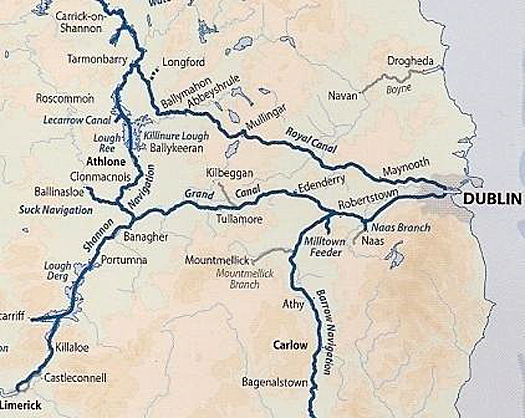
Nick Theato is Treasurer of the Lough Derg RNLI Fundraising Branch and Lough Derg Lifeboat Station at Dromineer.
Pat Kelly is Secretary of the Lough Derg RNLI Fundraising Branch.
Nick and Pat welcome all sponsorship, however modest. Contributions can be pledged online at http://www.mycharity.ie/event/green_silver_event/. Nick may be contacted on 086 1738014 ([email protected]). Pat is at 087 6908099 ([email protected]).
For further details / interviews / photos: Contact Pat Kelly at 087 6908099 ([email protected]). Support photography: Gerardine Wisdom 087 6522582 ([email protected]).
60-foot Barge Sinks in Killaloe
Killaloe Coast Guard Unit was tasked to a 60' barge that was sinking at its mooring on Lough Derg on the inland waterways this afternoon. The Killaloe Coast Guard Unit dispatched two vehicles with crew and salvage pubs by road and the rescue boat "Dalton" was sent to place anti-pollution booms.
According to the Coastguard after many hours it was obvious that even with four pumps and a slurry tank the barge had sat on the bottom listing to starboard. A second slurry tank and the fire and rescue service from Nenagh also assisted.
Garrykennedy Sailing Club
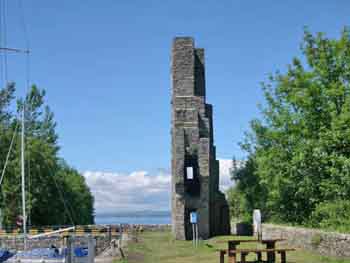
Garrykennedy Sailing Club
Garrykennedy Sailing Club was founded in The Barge Inn, Garrykennedy (now Larkins) in the first week of September 1985. The subscription was set at £5 and twenty people became members. Willie McGrath was the first Commodore. The first series prize was donated to the club by Joe Reynolds in memory of the late Eddie Regan and was sailed for in October of that year. The boats sailing ranged in length from 17ft to Jubilee B at 33ft. During that series there were about 12 boats in the fleet.
Left: Garrykennedy Castle
(The above information and image courtesy of Garrykennedy Sailing Club)
Garrykennedy Sailing Club c/o Jim Hughes, Garrykennedy, Portroe, Nenagh, Co Tipperary. Tel: 067 23001, email: [email protected]
Have we got your club details? Click here to get involved



























